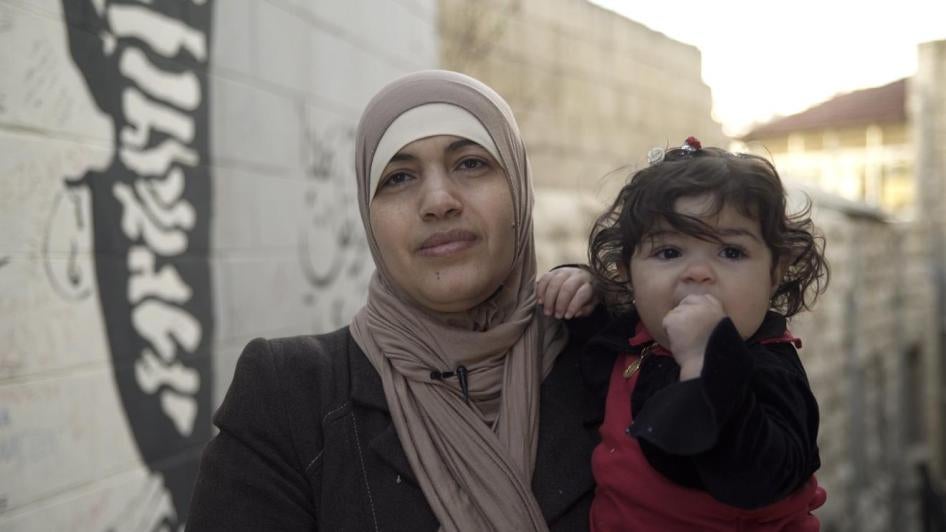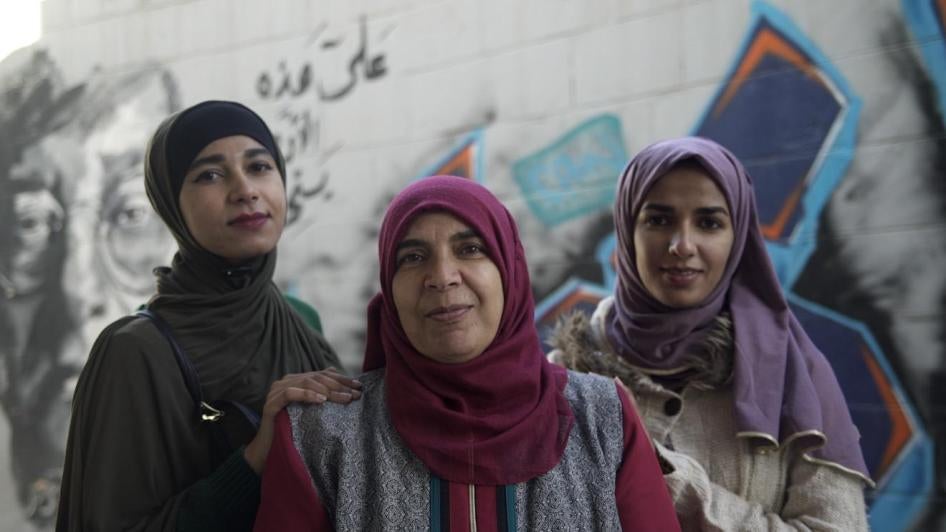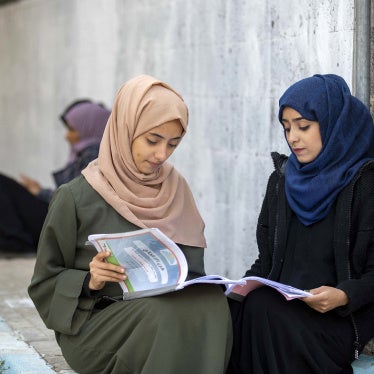A child born to a Jordanian mother and a non-Jordanian father is not a citizen in the eyes of the state. In violation of international human rights law, and Jordan’s constitution, Jordanian law discriminates against Jordanian women by not permitting them to pass their nationality to their children on an equal basis with men.
Many of these children were born and raised in Jordan and have known no other home. Yet the government treats them as foreign nationals with no permanent right to live or work in the country, and restricts their ability to own property, travel from and return to Jordan, afford higher education, and obtain government-funded health care. The multiple forms of exclusion and discrimination often severely diminish their prospects and place undue economic and social burdens on their families.
- Jordanian authorities introduced reforms in 2014 that were widely advertised as offering “civil rights” or “privileges” to non-citizen children of Jordanian mothers. Do non-citizen children still face restrictions after these widely advertised reforms?
- What is Human Rights Watch calling for?
- Is Jordan unique in denying equal treatment for women in passing citizenship to their children?
- Jordan is a small country and has already accepted millions of refugees. Won’t granting non-citizen children of Jordanian women citizenship, or even just key economic and social rights, overwhelm the local economy and destabilize the country?
- Most Jordanian women married to non-Jordanians are married to Palestinians. Wouldn’t granting their children citizenship negate their right of return?
- Won't granting non-citizen children of Jordanian women citizenship change Jordan’s demographic make-up and eventually turn Jordan into an alternative homeland for the Palestinians?
- Doesn’t Jordan have sovereignty to grant citizenship in accordance with its own internal rules?
- Why is Human Rights Watch focusing on Jordan when other countries in the Middle East discriminate against women in their citizenship laws?
- Jordanian authorities introduced reforms in 2014 that were widely advertised as offering “civil rights” or “privileges” to non-citizen children of Jordanian mothers. Do non-citizen children still face restrictions after these widely advertised reforms?
- What is Human Rights Watch calling for?
- Is Jordan unique in denying equal treatment for women in passing citizenship to their children?
- Jordan is a small country and has already accepted millions of refugees. Won’t granting non-citizen children of Jordanian women citizenship, or even just key economic and social rights, overwhelm the local economy and destabilize the country?
- Most Jordanian women married to non-Jordanians are married to Palestinians. Wouldn’t granting their children citizenship negate their right of return?
- Won't granting non-citizen children of Jordanian women citizenship change Jordan’s demographic make-up and eventually turn Jordan into an alternative homeland for the Palestinians?
- Doesn’t Jordan have sovereignty to grant citizenship in accordance with its own internal rules?
- Why is Human Rights Watch focusing on Jordan when other countries in the Middle East discriminate against women in their citizenship laws?
Yes, significant restrictions. The 2014 reforms, in the form of a cabinet decision, promised to ease restrictions on non-citizen children of Jordanian women, but many still struggle to renew their residency permits, obtain work permits, get government-subsidized health care, enroll in public education, own property, invest, and even to acquire a driver’s license. By and large, because the cabinet decision cannot supersede existing laws, government agencies still subject them to the same laws and regulations that govern services for foreign nationals.
The cabinet decision established a special identification card, which promised to ease access to these services. But major barriers to obtaining a card and to using it quickly became apparent. Many people have not been able to get, or could not afford to seek, the long list of documents required to apply.
Some applications were rejected because the cabinet decision requires the Jordanian mother to have legally lived in Jordan for at least five consecutive years before they apply – a provision the Jordanian National Commission for Women considers discrimination against Jordanian women’s citizenship rights and their freedom of movement. By February 2018, only 20 per cent of non-citizen children of Jordanian mothers registered with Jordan’s civil status department had obtained ID cards.
Even for those who did, many reported little or no improvement in their circumstances. They still have to renew their residency permits annually, a cumbersome process. And people who need work permits still confront significant legal and regulatory barriers to jobs for which they are otherwise qualified. Although the cabinet decision promised to reform property ownership, investment, and driver’s license requirements, no changes have been made in these areas.
The only noticeable improvements have been in care at public hospitals and enrollment in public schools. But those who cannot get ID cards or meet the mother’s five-year residency requirement do not have this access, and some reported that they were charged higher fees at public hospitals than Jordanian citizens despite presenting identification cards proving their status.
Jordan should respect its international human rights obligations, as well as its own constitution, by amending the nationality law to provide nationality through a child’s mother on an equal basis with the child’s father.
Article 6 of the Jordanian Constitution guarantees equality to all Jordanians before the law with “no discrimination between them as regards to their rights and duties on grounds of race, language or religion.” Jordan also ratified a United Nations treaty in 1992 that requires the government to end all discrimination against women.
Until the nationality law is amended to comply with the constitution and international human rights law, the Jordanian Parliament should amend the relevant laws to grant non-citizen children of Jordanian women automatic permanent residency, exempt them from the work permit requirement, allow them to work in professions restricted to Jordanians, provide all such children a government-issued identification card, and give them the same rights as Jordanian citizens to health care, education, and driver’s licenses.
No. According to the Global Campaign for Equal Rights, 27 countries deny women the equal right to pass nationality to their children, about half of them in the Middle East and North Africa. But rather than show leadership in the region, Jordan is lagging behind. Since 2004, Algeria, Egypt, Morocco, Tunisia, and Yemen have amended their laws to allow women to pass citizenship to their children on an equal basis with men. Iraq and Mauritania amended their laws to allow women to confer nationality to children born in the country if the father is foreign.
Some other countries, like Jordan, have taken partial measures to extend some rights and benefits to non-citizen children of citizen women while continuing to deny them nationality. In 2011, a UAE decree provided that non-citizen children of Emirati women should have equal access to education, health, and employment. In Saudi Arabia, a 2013 royal decree gave these children the same rights as citizens for education, health care, and work. Qatar is considering a draft law to allow permanent residency for children of Qatari mothers and foreign fathers, which would provide them with free government health care and education. However, as Jordan’s case demonstrates, these “halfway measures” still leave in place a clearly discriminatory system.
Jordan should largely be praised for its treatment of refugees, including most recently over half a million Syrians. But these individuals are not refugees. The majority were born, raised, and educated in Jordan. Their status causes them to struggle to get basic rights and services. It forces many to work on the margins of the economy – often illegally – and severely impedes the ability of those with special skills, capital, and higher education to fully contribute to the economy.
Research indicates that it is counterproductive to marginalize people born to foreign fathers. A 2011 report by the King Hussein Foundation’s Information and Research Center, co-authored by the Jordanian economist and former Minister of State for Economic Affairs Yusuf Mansur, found that granting the children of Jordanian women and foreign husbands economic and social rights would increase tax revenues and consumption.
The study also found that granting these children permanent residency would allow them to assimilate professionally and socially, increasing their prospects for higher education, and ultimately leading to the development of human capital and potential long-term economic growth. If the sons and daughters of Jordanian women can fully contribute to their communities, not only would they not be a burden; rather, they’d help lift the Jordanian economy.
The “right of return” is enshrined in international law and Palestinians are afforded this right regardless of the nationality or legal status they acquire in their places of refuge. But most of those Human Rights Watch interviewed did not mention this issue. All had been born in Jordan and many had never even been to Palestine. “Hala,” 32, born to a “Gazan” father and a Jordanian mother, dismissed the concept altogether: “My dad would return [to Palestine] if he could, my grandfather would return, but me? I am Jordanian, what happens to Jordan happens to me.”
Jordanian politicians and officials often cite such a link to justify the country’s discriminatory nationality law. But King Abdullah II has repeatedly assured Jordanians that the “alternative homeland” concept is not up for discussion. In a February 2014 meeting with top officials, the king described the concept as an illusion. “I have said and I would like to say again: Jordan is Jordan and Palestine is Palestine and nothing but that, not in the past, or the present, or the future.”
More than 40 percent of Palestinians who fled their homes or were expelled by Israel in 1948 and 1967 have settled in Jordan, making it home to the largest concentration of refugees in the Palestinian diaspora.
But Jordan permits Jordanian men, who may have as many as four wives, to pass on their nationality to those wives and their children regardless of their place of birth or residence. According to Jordan’s Department of Statistics, more Jordanian men are married to Palestinian women than Jordanian women to Palestinian men. This justification is clearly discriminatory against women.
Yes, but Jordan is required to exercise its power over people’s lives in accordance with its obligations under international law, which require Jordan not to discriminate against women.
While Jordan does not have a clear definition of discrimination in its own laws, under international law, discrimination against women is defined as “any distinction, exclusion or restriction made on the basis of sex which has the effect or purpose of impairing or nullifying the recognition, enjoyment or exercise by women, irrespective of their marital status, on a basis of equality of men and women, of human rights and fundamental freedoms in the political, economic, social, cultural, civil or any other field.” Based on this definition, Jordan’s nationality law directly discriminates on the basis of gender.
Human Rights Watch has criticized other countries for discriminatory citizenship laws and documented their serious economic and social consequences across the region. Most recently, Human Rights Watch said that Qatar, which reportedly approved a draft law granting permanent residency to non-citizen children of Qatari women, should instead allow women to confer nationality to their children on an equal basis with men. Human Rights Watch also criticized a discriminatory and deeply flawed Lebanese draft law that allows women to confer nationality to their children that excludes women married to men from neighboring countries.
While Jordan has been a leader among countries in the Middle East in joining international human rights treaties, and carrying out human rights reforms, it lags behind a number of other countries in its treatment of women and their non-citizen children. Continued inaction will consign another generation of children with Jordanian mothers to inequality and discrimination.











